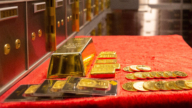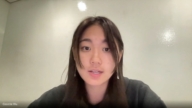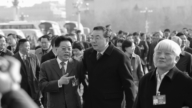【新唐人2012年1月20日讯】18号上午,台湾国史馆发表《蒋中正总统五记》新书发布会。《五记》是摘录蒋介石日记,以编年体方式分类抄写,全部原文重现,一字不漏,国史馆希望“还原历史、认识民国”。研究蒋介石生平的学者表示,《五记》的相关记述不仅反映蒋介石个人立场,也提供极具历史意义的细节。两岸何去何从? 可以从历史中找到线索。
《蒋中正总统五记》是从蒋介石日记中抄写出来,分成五个主题,包括《困勉记》、《游记》、《学记》、《省克记》、《爱记》等。
国史馆长吕芳上表示,《五记》提供的讯息足以作为蒋一生个人行止、和近百年国家走向的重要参考资料。内容虽然重新打字整理,但全部原文重现,一字不漏,希望“还原历史、认识民国”。
“蒋介石研究群”召集人黄自进指出,《五记》以日记原稿为基础,参考其他手稿编撰,更能明白当时事件的始末。例如1940年3月,日本一手扶持的“汪伪政府”成立于南京,11月,日本外相松冈洋右向重庆国民政府谋和,《五记》点出居中牵线的是银行家钱永铭。
“蒋介石研究群”召集人黄自进:“所以这五记是分门别类的,从日记里面节录出来的,它好处,首先日记没有的东西它绝对不会无中生有,所以它的真实性、史料的可靠性很高的。在日记里面是记述当天他面临的事情、他的所感,所以他有些事情,人跟事他不是交代很清楚的,可是五记,是后来的…他的秘书帮他重新编撰的时候,会把关键的人跟事补进去,所以看日记的时候,你有时候看不清楚,看五记反而可以看得清。”
蒋介石的旧部属—-原行政院院长郝柏村,及蒋介石生前身边人士出席了《五记》的发布会,他们都推崇蒋介石的人格特质、肯定他一生为“民族、国家、民主自由”所做的奋斗。
黄自进:“我从来没看过日记能够那么样去真实面对自己,这是我们觉得蒋介石日记里面他的可贵。蒋介石日记是从1917开始写起,到1972年,55年的日记,几乎每一天都没有停,他偶尔停,他会写,今天生病没有写日记,不过在55年岁月里面这日记没写的其实并不多,这也是他的日记评价那么高,五记还有出版的价值的原因。”
郝柏村去年出版《解读蒋公日记:1945-1949》,他希望把八年抗战期间蒋公日记中,有关军事部分再解读出来。他表示,在大陆,完全没有抗战历史真相,他认为,蒋公日记是证明历史真相的证据。
原中共中央文献研究室委员、“周恩来生平研究组”组长高文谦向《新唐人》表示,还原历史本来面目,让民众了解历史真相,中国才能往前进步。
高文谦:“民众是有知情权的,中共的历史,实际上就是一个为中共自己解释自己权力合法性的这么一个历史,所以中国今后的任何的进步,必须要还历史本来面目,还毛泽东—-文化大革命,还邓小平—-镇压六四,像江泽民的话,镇压法轮功,胡锦涛的话,重判刘晓波,像这几件事情的话,迟早要把这些案子都彻底的给翻过来。”
曾经担任两蒋秘书的楚崧秋也出席了《五记》新书发布会,据报导,他是在1954到1958年之间,也就是在台湾命运面临生死存亡的时候追随蒋介石,他说“蒋公”是打从内心的服膺国父孙中山,是真心“为国为民”。
新唐人记者常春、周平、孙宁采访报导。
New book of Chiang Kai-shek’s Diaries Released, Expected to Recover Historical Truth
On January 18th, Taiwan’s Academia Historica released its
new book, “Five Diaries of President Chiang Kai-Shek.”
The book excerpts Chiang’s diaries chronologically, and
preserves the original writing.
Academia Historica hopes to recover the true history
of Chiang and the Republic of China during his presidency.
Scholars of Chiang commented that, the “Five Diaries”
not only reflects Chiang’s personal opinions, but also provides precious historical details.
Clues in the book might be found for dealing with future
cross-strait relations.
Excerpts from the new book, “Five Diaries of President Chiang
Kai-Shek,”
are categorized into five themes including diligence,
touring, study, introspection and compassion.
Director of the Taiwanese Academia Historica, Lu Fang-sang,
said that information from the book provides sufficient
references to obtain an in-depth picture of Chiang’s personal
behavior and Republic of China’s history throughout his life.
Though the contents have been rearranged, every word in
Chiang’s diaries is published exactly in its original form,
“recovering the true history of Republic of China.”
The organizer of Chiang Kai-shek Research Group”, Huang
Tzu-chin, said the “Five Diaries” is based on the original diary scripts, referring to some other scripts as well.
This makes it easier to understand historical events in a more
comprehensive way.
For example, in March, 1940, Wang Jingwei’s regime was
established in Nanjing under the support of the Japanese.
In November of the same year, the Japanese minister of foreign
Affairs, Yosuke Matsuoka,
with government of Republic of China,
sued for peace in Chongqing.
The “Five Diaries” reveales the fact that it is the banker
Qian Yongming who delivered the message.
Huang Tzu-chin: ”The diaries are categorized into five themes,
which are excerpted from Chiang’s diaries.
One advantage of the book is that, it doesn’t fabricate that
which is not written in the diaries, so it is a very reliable historical recording.
On the other hand, some of the diaries only tell us the
happenings on a particular day and his feelings on it,
but the cause and effect is sometimes unclear or missing.
This book has been edited by his secretary, who added the
necessary details back in.
So for some events you can learn more from the “Five Diaries”
than from the original diaries.
Chiang’s subordinate, the former premier of Taiwan,
Hau Pei-tsun, along with some other Chiang’s acquaintances, attended the book’s launch event.
They all praised Chiang’s personality with complimentary
words regarding his struggle for the country and its democracy.
Huang Tzu-chin: ”I’ve never seen a diary which depicts as
true a man like Chiang Kai-shek’s does.
He insisted on writing diaries from 1917 to 1972.
He rarely skipped a day during those 55 years.
He still wrote, “I am ill today so I can’t write” on days he had
to pause, and it didn’t happen many times in his life.
That’s why his diaries are highly regarded and need to be published.”
In 2011, Hau Pei-tsun published the book “An Insider’s
Viewpoint on Mr. Chiang Kai-shek’s diary: 1945-1949.”
He expected it would provide insight into the
military-involved diaries during the Second Sino-Japanese War.
Hau said that little has been revealed in Mainland China about
the war; Chiang’s diary could strongly support the truth.
The ex-committee member of the CCP Central Literature
Research Center, Gao Wenqian, told NTDTV that China
won’t advance until true history is recovered and made known
to the Chinese people.
(Gao Wenqian):”The Chinese people have a right to know.
the CCP always explains or fabricates historical events
in a way that supports the “legality of its authority.
Therefore, factual history has to be recovered before
any real political progress can be made in China.
A list of important historical events include Mao’s true
personality and life, the Culture Revolution, Deng Xiaoping’s
suppression of Tiananmen Square protests, Jiang Zemin’s
persecution of Falun Gong, and Hu Jintao’s execution of Liu Xiaobo.
The lies told by the CCP have to be uncovered sooner or later.”
The secretary of Chiang Kai-shek and Chiang Ching-kuo,
Tsu Sung-chiu, also attended the new book’s launch.
Tsu is reported to have followed Chiang Kai-shek between
1954 and 1958, which was Taiwan’s most trying time.
He said that Mr. Chiang is a true follower of Sun Yat-sen
and has worked for the country and its people with truthfulness.
NTDTV reporters, Chang Chun, Zhou Ping and Sun Ning




























